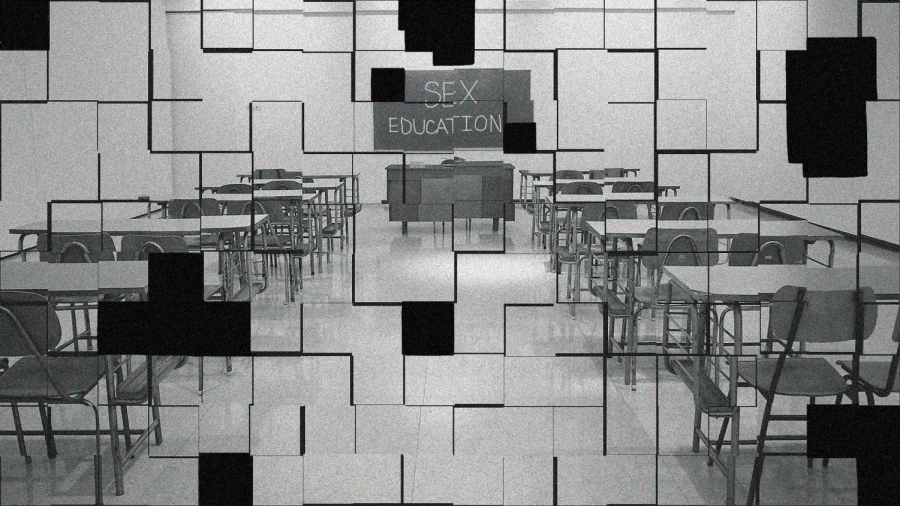Dunn: We Need Comprehensive Sex-Ed
(Graphic by Mason Orr | The Daily Utah Chronicle)
March 1, 2023
This legislative session has seen several bills aimed at teachers and education. Two, in particular, are S.B. 55 and H.B. 344. Both bills are aimed at establishing policies for curriculum transparency and expanding parental involvement in public education. However, these bills will be detrimental to Utah sex education.
S.B. 55 would create an open process between school boards and parents for approving curriculum. H.B. 344 would require teachers to provide a full syllabus and update parents on any course changes. This is an unneeded level of oversight that would allow parents to micromanage teachers and is a step in the wrong direction for sex education in Utah. By allowing parents to oversee health teachers, these bills would allow for even more material to be taken out of health classrooms.
Sex Education in Utah Today
Teenagers have been receiving less and less sex ed in recent years. The Guttmacher Institute reported that, on a national scale, less than 50% of teens have gotten instructions on birth control between 2015 and 2019. They also reported that the number of adolescents receiving formal birth control instruction has been decreasing since 1995. The current Utah state standard for sex ed policies states that while it is required to teach sex ed, it is not required to be comprehensive.
Comprehensive sex ed is a curriculum style designed by the American College of Obstetricians and Gynecologists. It recommends that sex ed material be medically accurate, age-appropriate and continuous. It also recommends instruction on gender identity, sexual orientation, healthy sexual expression and contraceptives.
But in Utah, the curriculum stresses abstinence and is not required to teach about sexual orientation or gender identity, or advocate for contraceptives. Utah sex ed is also an “opt-in” system, which means that students must have parental permission to enroll in the course at all. Additionally, the 2021 legislative session killed a bill that would have required sex ed classes to teach consent. Instead, those classes must teach “refusal skills.” By teaching “refusal skills” instead of consent, Utah sex ed classes don’t give students enough knowledge on how to communicate healthy boundaries. “Refusal skills” also put all responsibility for stopping unwanted sexual advances on the teen, thereby reinforcing a mentality of victim blaming.
How Culture Plays a Role
Utah sex education has long been influenced by the state’s culture surrounding sex and sexuality. The Church of Jesus Christ of Latter-day Saints, like many other Christian churches, promotes abstinence until marriage. As the dominant religion in Utah, their abstinence-based mentality has affected the state legislature. To illustrate, one 2012 house bill required health classes to teach that abstinence until marriage, and fidelity afterward, were the only way to prevent “certain communicable diseases.”
The culture surrounding sex ed in Utah has led parents to not realize the benefits of comprehensive sex education. Groups including Utah Parents United have been opposing comprehensive sex ed for years, despite this kind of education being based on science and with teen health in mind.
Dr. Ana Antunes, assistant professor in gender studies at the University of Utah, teaches a course on sex and sexuality education and explained this misunderstanding further. “I think one of the misconceptions that people have about sexuality education is that people are trying to convert or change people’s minds,” she said. “And it’s not about that. It’s about giving people enough information to make a decision based on their own values.”
If S.B. 55 and H.B. 344 were to pass, the only parents involved would be those with the time and resources to become active in the school boards and curriculum reviewing processes. While this could be a way for a more diverse group of parental voices to be heard, that can’t be guaranteed if only a small group of parents are even able to be involved.
Dr. Kim Hackford-Peer, the associate chair of gender studies at the U, is involved with an internship program teaching undergraduate students how to design and implement curriculum. She said, “It can’t just be one perspective, or from one community or one type of parent, right? We need a diversity of opinions in order to make more well informed, thoughtful decisions.” She also stated that “parents who would before just opt their child out, are now potentially going to be the reviewers of the curriculum. And then I see the real danger is that then there’s this lessening or narrowing of what’s even available to opt your child into.”
Bring in What Works
The value of comprehensive sex education in public schools must be acknowledged. Sex ed works. According to the CDC, teens that are given quality sex education tend to delay initiation of sexual activity, have fewer sexual partners and increase their use of protection.
Comprehensive sex education that stresses consent can also decrease instances of sexual violence. Utah’s lack of quality sex ed is reflected in our own sexual violence statistics. According to the CDC’s Youth Risk Behavior Surveillance System, in 2019 high school youth in Utah were more likely to have experienced sexual violence than the national average.
The Utah legislature must stop micromanaging teachers and creating the potential for the continued removal of sex ed from classrooms. Instead, the legislature and parents must trust health and education professionals. There needs to be more comprehensive sex ed implemented to reduce ignorance and shame and give teens the tools they need to have safe relationships.
“The access [to comprehensive sex ed],” said Hackford-Peer, “also provides the opportunity to be involved in sexual and romantic relationships without shame, without stigma, without fear because we’re confident. We understand how our bodies work … And none of that is what young people in Utah are getting already.”












